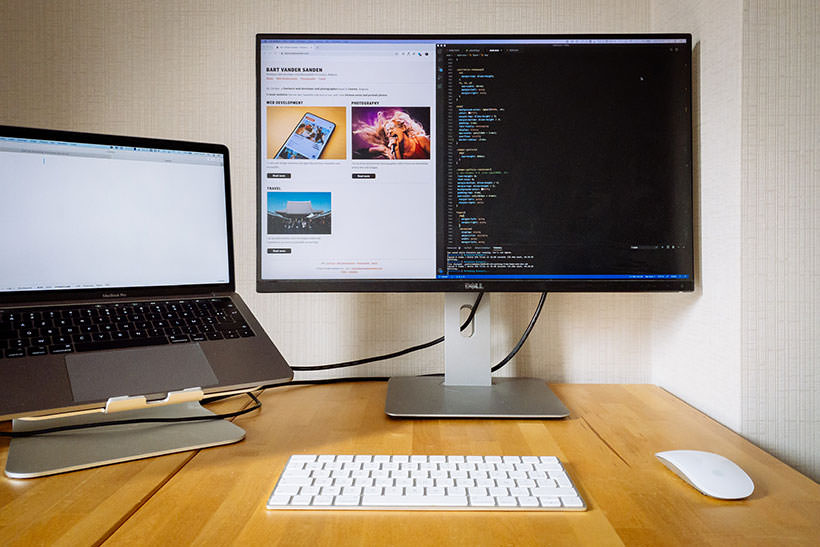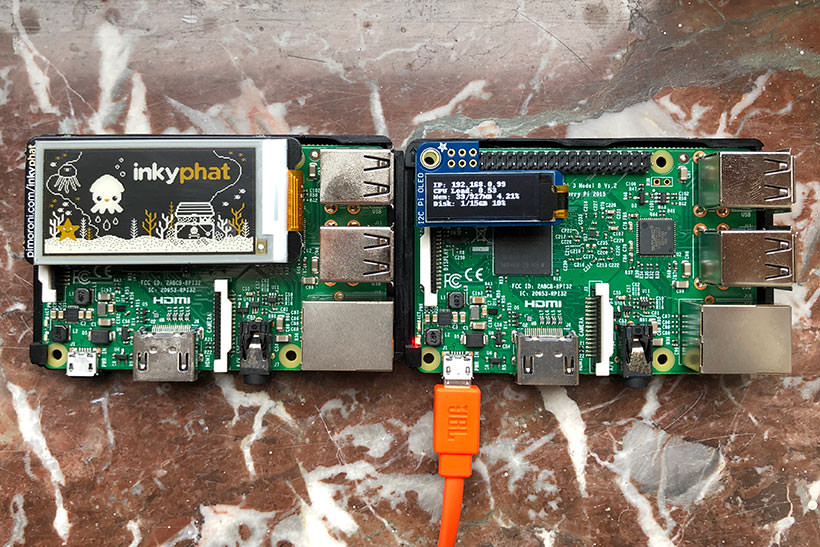As more and more people are working from home at the moment due to the measures taken for Covid-19, I thought it might be interesting to write down some tips and tricks I've learned in the last couple of years while having my main desk at home.
As an independent web developer since 2016, I'm spending the majority of my working days at home. At first, not having to leave the house to get work done seems like a dream, but it took quite some time to find the right balance of work, life and general happiness.
Wether you're forced to stay at home or by choice: staying inside has some major benefits, but don't forget to take the pitfalls into account.
Your Work Space

Not having to go to an office might give the impression that you might as well work wherever you want at home, but I highly suggest setting up a dedicated space for your computer for the foreseeable future. As the name implies, working from home still involves, well, working, and if you're working from, say, your couch (don't even think about working from your bed), you'll start to associate that place with work after a while.
If possible, try to create a work space in a spare room, and if that's not possible, sit at a table with a decent chair. Your sanity (and your back) will thank you later.
Working with Other People
Fundamentally, working from home means you won't see your colleagues and clients face to face anymore.
It's still important to have some line of communication at your disposal to keep everyone on the same page, but modern apps and services allow for ways of working that are more tuned to the realities of being in another place than just using a phone to make calls.
Try to Use Asynchronous Communication Channels
In my opinion there's no point in trying to make working from home feel like you're working in the office. If you're working in an office it's quite easy to get everyone together in a meeting room, but you can't do this if everyone is at a different location.
While it's possible to set up a video call over Skype, Google Meet and Zoom, it's probably easier to embrace communicating asynchronously.
What does this mean? Basically: when you send or receive messages, you don't have to reply to them instantly. This takes away the pressure to drop everything on the spot to pick up the phone, so it's way easier to focus on the task at hand.
Some tools optimised for this way of working
- Slack: the de facto standard for asynchronous messaging in the work place nowadays. You can create separate channels for each project, which keeps everything clean and tidy.
- Trello: an excellent project management tool to keep track of the things you have done and need to do.
- Git: version controle software that helps developers work together on code. Also very useful for developers to keep track of their code changes. Often used on GitHub or BitBucket.
- Email: tried and tested, this is still an excellent way of communication.
Some tips on working asynchronously
- Turn off notifications. If it's super important they will call you.
- Don't forget to share your progress with your team or client. When I push a new update to a site in development I try to send them a list of the changes, so they don't have to find out themselves after the fact.
- If anyone shares their progress with you: confirm that you received and read it, even if you don't have any remarks.
- Try to group your questions/remarks/progress in a single message per job. It's hard to follow along if you have to get through each message/mail one by one.
Online meetings
Sometimes online meetings are still necessary. For example, talking to a new client is probably easier with video and audio, sometimes things are too hard to explain in text form, or you want to guide your client to a step by step process.
In these cases, make sure you've tested your audio and video settings beforehand (most tools, like Zoom, Google Meet and Skype have tests for this), and set up some rules for these situations with the people you're living with (don't let them turn up their music, wear headphones, don't have two meetings at the same time if they're sitting next to you, …).
Be realistic with your timings
Working from home is different in a lot of ways compared to the usual office stuff. Some people tend to get more stuff done at home, but others might work at a slower pace. We're going through some strange times so don't expect the output to be the same as before.
Also, if you're working on stuff that needs a lot of horsepower and you don't have your work desktop with you: let your team/client know that you won't work at the same speed.
Leave Your Work 'At Work'
Try not to work outside of your regular work hours. Working from home should not mean working longer without a good reason, so don't check your mails in the evening, and don't pick up the phone after regular working hours. And put your laptop away during the weekend.
Prioritise
This probably goes without saying, but give priority to projects and clients that are feeling the effects of the corona virus over projects that are not impacted.
Stick to a Routine
Most people have a relatively strict schedule when they're working outside of the house: they get up in the morning, they get dressed and have breakfast, they take a car or public transport and they arrive at the office. After work, they head home and (ideally) won't think about work until the next morning.
When working from home, this schedule often gets thrown out of the window, yet it might be a good idea to keep a routine. This way, you'll have a clear structure in your day, so you'll be able to focus better on your work and you'll be able to clear your head afterwards.
Here are some personal routines that work for me at the moment:
- Try to wake up at your regular time (unless you're usually waking up at an ungodly early hour, then by all means, stay in bed longer).
- Get dressed before starting your work day. This really helps me in feeling ready for the day.
- Check the day of the week before starting work. It sounds ridiculous but staying inside for days at a time can be very disorienting.
- Don't take long lunch breaks. I feel like taking long breaks at noon (more than 30 minutes) breaks up the day too much, so I try to make them short and sweet.
Saving Precious Time from your Commute
Another part of not going into an office is that you won't have to endure traffic or your commute each day. While you might be tempted to just stay in bed longer or start working earlier, I'm finding this extra time to be great to work on other stuff:
Cooking

One of the key parts of making working from home enjoyable for me is that I have tons of moments I can use to prepare food. Most of the time the recipes that I'm using are not hard, but they ask for some patience, so quite regularly I take my laptop near the kitchen so I can keep an eye on a sauce I'm making, or a roll of bread that's sitting in the oven.
Some resources for inspiration:
Learn and Read Stuff

These times are great for learning new stuff and improving your skills. Use your saved commute time as a way to read up on things you always wanted to learn more about but you never found the time for, or just use it to get through your untouched books on the shelf.
These are some things that I've been working through lately:
- An Event Apart recently uploaded tons of conference talks from last year. Great for learning more about the state of the web.
- As always, CSS-Tricks and Smashing Magazine are great sites to improve your web skills.
- Over the years JavaScript has been changing quite drastically, and I, like many others probably, often use the outdated syntax instead of the new, more streamlined ES2015 (and up) way of doing things. Eloquent Javascript has been a great help in resetting my way of thinking about JavaScript as its clear writing will help both novice coders and more experienced veterans.
- The documentation of React is quite good and perfect if you want to try out the framework.
- Humble Bundle often sells excellent programming books dirt cheap. At this moment they're selling a collection of O'Reilly books at an insanely low cost.
Pet Projects

Maybe you want to write about stuff, maybe you want to create a small app, maybe you want to get into photography, or maybe you have a bunch of Raspberry Pies lying around that you haven't used in ages. Use your extra time to finally work on these pet projects.
Other Tips During These Times
- Try not to check the news too much.
- Reach out to your friends and colleagues, ask them how their day is going.
- Call your friends and family often
- Don't forget to relax. Play some video games, watch a movie, listen to some music, …